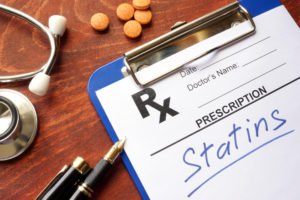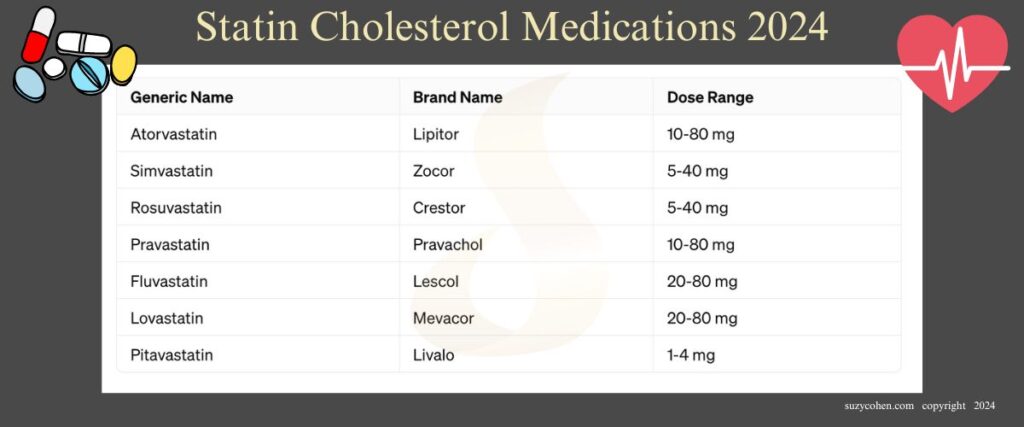What's On This Page?
ToggleTaking Statins? Beware of cramps! This article is about how statin medications can lead to a higher risk of cramps, muscle aches and back pain.
If you’re one of the millions of people diagnosed with high cholesterol, you will more than likely be given a prescription “statin” pill. It’s easier to take a statin, truly I get it, it’s hard to control diet and to exercise and to live a life of limitations after all this time. For a satirical look at what you need to do before taking a statin, read my quick (and somewhat silly) scenario at the doctor’s office here.
Interested in natural ways to reduce cholesterol? Recently, there was a great marketing campaign that increased sales for Oreo cookies. Yeah/No! They don’t lower cholesterol, but you might want to read my article about this, 7 Natural Ways To Manage Cholesterol: Beyond Oreos.

Statins – Meet the Clan!
-Lovastatin for Mevacor
-Atorvastatin for Lipitor
-Pravastatin for Pravachol
-Fluvastatin for Lescol
-Simvastatin for Zocor
-Pitavastatin for Livalo
-Rosuvastatin for Crestor
-Others in combination form
What do the above statins do?
Statins affect many pathways in the body. They are strong anti-inflammatories, so strong that they are being tested for their use in cancer patients! As for cholesterol reduction, they work by crushing a natural enzyme in your body that would otherwise allow you to make your own cholesterol.
How Do Statins Cause Muscle Cramps Anyway???
If you’re dealing with muscle cramps while on statins, you’re not alone. Many of my readers have shared their struggles with this bothersome side effect. Let me tell you about what might be going on inside your body.
Statins work by blocking a particular enzyme in your body known as HMG-CoA reductase. This enzyme isn’t just responsible for making cholesterol; it also helps make something called coenzyme Q10 (CoQ10). CoQ10 is crucial because it powers your mitochondria, which are like little energy factories in your cells, especially abundant in your muscle cells. When statins lower your CoQ10 levels, your muscle cells might not produce enough energy, which can lead to cramps and aches.
Additionally, statins might be tweaking the cell membranes in your muscles or messing with the way calcium flows through these cells. Calcium is vital for muscle contraction and relaxation, so any disruption here can lead to cramping.
There’s also a more severe muscle condition called rhabdomyolysis, which can occur, but it’s pretty rare. It involves significant muscle breakdown and can cause more than just cramps.
Genetics might also play a role here. Some people have genetic traits that make their muscles more sensitive to the effects of statins, which can lead to more frequent or severe cramps.
If you’re experiencing these symptoms, it might help to chat with your healthcare provider about adjusting your statin dosage or trying a different type. Some of my readers have also found relief by supplementing with CoQ10, but you should definitely do this under your doctor’s guidance to make sure it’s safe and effective for you. Remember, while statins do a great job managing cholesterol, they shouldn’t make you miserable. Let’s find a way to keep your heart healthy without compromising your quality of life.
These Drugs Do Not Neutralize Cheese Fries
These drugs merely suppress new production of cholesterol that you’d otherwise make in your liver. Here’s where blind faith (take this pill and you’ll feel better) collides with scientific research.
This year a study was published (in the Expert Review of Clinical Pharmacology), entitled,
Statins stimulate atherosclerosis and heart failure: pharmacological mechanisms. Repeat: “Statins stimulate atherosclerosis and heart failure.”
The researchers concluded, “The epidemic of heart failure and atherosclerosis that plagues the modern world may paradoxically be aggravated by the pervasive use of statin drugs.”
What an irony! My concern (and I’m not trying to talk you out of anything) is that some other studies have found similar harmful effects on the heart. The potential deleterious effect (and it’s not a given, just a potential) may have to do with mitochondrial dysfunction, which refers that the little generators in your heart cells get sick. I sometimes call them “mito” instead of “mitochondria” depending on how caffeinated I am.
Whatever you want to call these guys, you have about 10 pounds of them in your body. They make energy – they’re like batteries.
Given that your heart is a very high-energy muscle, it requires thriving, perfectly-running mitos and LOTS OF THEM! The mitochondria have to constantly churn out ATP or we die. ATP is our universal energy molecule in the body.
Statins are pretty toxic to mitochondria because they deplete coenzyme Q10 which is essential for healthy mitochondria. But the drugs may have redemptive qualities, it really depends who you ask.

Statins Deplete Heme A
There’s a fascinating angle involving something called heme a, which you might not have heard much about. Heme A is a crucial component of an enzyme called Cytochrome C Oxidase, which plays a vital role in the health of your mito. This enzyme is at the heart of energy production, helping convert oxygen and nutrients into energy like ATP.
Now, when you take statins they inhibit that enzyme HMG-CoA reductase. This enzyme is also in charge of making soprenoids which are molecules essential for making Heme A (as well as CoQ10).
So, what happens when statins block this biochemical pathway involving HMG-CoA reductase? They inadvertently reduce the production of Heme A, which can throw a wrench into the works of cytochrome c oxidase causing muscle fatigue or weakness. It’s like your cellular engines aren’t firing on all cylinders! It becomes uncomfortable to live in your body after a while.
Do you? I don’t know anyone who has a perfect gut. K2 also comes from greens, and salads, and fermented veggies. It protects our arteries from calcium plaques or atherosclerosis. Without enough K2, statin-induced or not, we are compromised. (Eye roll now).
Today, we know statins block very special, powerful selenium-containing proteins known as selenoproteins, the most famous of those is called glutathione peroxidase, which protects muscle tissue from free radical damage (oxidation).

What’s the busiest muscle in your body?
It has to work 24/7. It’s your heart! (Smacks forehead).
Your heart muscle cells are ‘burned’ form all the oxidation (due to the impairment of selenoprotein biosynthesis) and this is a factor in congestive heart failure. This reminds me of Keshan’s disease which is heart failure due to low selenium.
5 Ways to Improve Safety While Taking Statins
- Use the Lowest Dose Possible: Start with the lowest effective dose of statins to minimize potential side effects.
- Replenish Nutrients: Statins can interfere with the absorption of certain nutrients. Be diligent about supplementing with:
- Coenzyme Q10
- Selenium
- Vitamin K2
- Other heart-healthy nutrients
- Consult Your Doctor: Before adding supplements, consult with your doctor—the same one who prescribed the statin—to discuss whether these supplements are appropriate for you and to consider any exceptions.
- Understand Individual Needs: Remember that the dosage of vitamins and supplements is highly individualized. Factors such as age, sex, weight, kidney or liver function, and even genetic SNPs can affect the appropriate dosage.
- Recognize the Role of Essential Nutrients: Understand the critical role that essential nutrients play in your body’s functioning. Medications do not replace these necessities. For example:
- A deficiency in the natural B vitamin folate can impair methylation processes.
- Impaired methylation can lead to toxin buildup and adversely affect cholesterol ratios.
Summary
This is a classic case of drug mugging, and I hope you will consider replenishing some of the affected nutrients, especially if you have uncomfortable or new symptoms. I wrote about this in my book, Drug Muggers. Also, keep in mind how important nutrients are in your body. Your body runs on the essentials, it does not run because of medication. As an example, if you have low levels of a natural B vitamin (folate) then you cannot properly methylation. If your methylation pathways are hindered, your toxins build up and your cholesterol ratios are adversely affected.
You may be interested in my other article on Genes, Methylation and Your Health.

Suzy Cohen, has been a licensed pharmacist for over 30 years and believes the best approach to chronic illness is a combination of natural medicine and conventional. She founded her own dietary supplement company specializing in custom-formulas, some of which have patents. With a special focus on functional medicine, thyroid health and drug nutrient depletion, Suzy is the author of several related books including Thyroid Healthy, Drug Muggers, Diabetes Without Drugs, and a nationally syndicated column.
